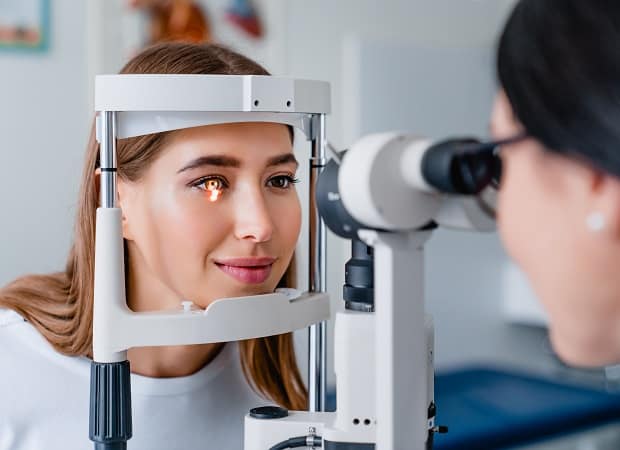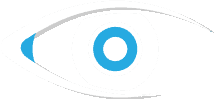
Eye ExamsFor St. Petersburg & Clearwater, FL
An eye exam measures more than how clearly you view the world around you. The series of tests our Ophthalmologists perform during your optical exam are designed to evaluate your vision and check for early signs of eye disease. Severe conditions such as glaucoma can degrade your ocular health quickly with little to no symptoms, which is why these exams are critical to maintaining healthy eyes.

What Can Eye Exams Accomplish?
The primary goals of an eye exam are to establish healthy eyes and good vision. These appointments detect problems when they’re most treatable at the early stages and allow our eye doctors to correct your prescription for glasses or contact lenses and offer proper eye care and safety tips. Eye exams can even detect issues with your overall health. Certain medical conditions cause eye changes and may require more frequent exams, including:
- Diabetes
- High blood pressure
- High cholesterol
- Lupus
- Rheumatoid arthritis
- Heart disease
- Stroke
- Cancer in the skin, tissues or blood
- And more

How Often Should You Have An Eye Exam?
Your age, health and eyesight dictate how often you need to see one of our Ophthalmologists. Children ages 3 and under should come in so that we can look for signs of childhood eye problems such as crossed eyes, misaligned eyes or lazy eyes. Children should have a comprehensive eye exam to evaluate eye alignment and pinpoint vision problems before starting kindergarten.
If you have poor vision because of farsightedness, nearsightedness, or astigmatism, you’ll likely have an eye exam to adjust your prescription once a year. Adults with no vision problems should have a thorough eye exam around age 40 when vision changes such as presbyopia as well as eye diseases start to develop. Our Ophthalmologists may recommend additional visits based on what they find. Adults 60 and older should be seen every one to two years to catch cataracts, macular degeneration, diabetic retinopathy and other eye diseases that affect aging men and women.
You may have eye exams more often if your family history involves eye diseases, vision loss or chronic diseases such as diabetes.

What Tests Are Performed During An Eye Exam?
Our Ophthalmologists perform several tests during your eye exam to ensure you have healthy eyes and good vision. These tests check your eyesight and the appearance and function of your entire eye:
- Eye Muscle Test: Evaluates eye movements for weakness, control and coordination
- Visual Acuity: Assesses eyesight using a printed chart with letters
- Refraction Assessment: Interchanging lenses are used to determine your prescription
- Visual Field Test: Measures the entire field of vision without moving the eyes
- Color Vision Testing: Dotted patterns are used to identify color deficiencies
- Slit-lamp Examination: A microscope illuminates the front area of the eye to examine the iris, fluid chambers, cornea, lens, iris, lashes and eyelids.
- Retinal Examination: Evaluates the retinal tissue that lines the back of the eye, including the optic disk and underlying layer of blood vessels.
- Glaucoma Screening: Measures eye pressure and dilates the eyes to examine the inner workings.

Signs You Need An Eye Exam
Ideally, you should have comprehensive eye exams every year to check your visual acuity and ocular health. But regardless of whether you’re good with scheduling annual eye exams or let it slide, there are certain warning signs you need to be aware of so that you schedule an appointment to see an eye doctor as soon as possible, including:
Worsening Vision
If you wear prescription eyeglasses or contact lenses, you’re more likely to have fluctuations in your prescription until your vision stabilizes, which often happens in your 20s. Vision stabilizes when your prescription stays the same for at least one year. You need eyewear that fits your current needs, so schedule an eye exam anytime you notice images getting blurry while wearing contact lenses or glasses.
If you’re 40 or older, you may start to experience blurry near vision, which is a natural part of aging and a sign of a condition called presbyopia. Prescription reading glasses or readers can restore good eyesight. Make an appointment if your vision has changed. The eye strain caused by poor vision can lead to headaches and accidents in your everyday life because you can’t see the objects in front of you clearly.
Risk Factors For Eye Disease
If you have a family history of eye diseases, such as diabetic retinopathy, glaucoma or macular degeneration, you need to be diligent about your eye care. Cataracts occur in most adults in their old age, but you can start developing cataracts earlier, especially if you have diabetes. People of African or Hispanic descent may be at heightened risk of certain eye diseases and therefore need regular eye exams to diagnose them early.
People who wear contact lenses or have a history of eye surgery or eye injury may be more likely to experience vision problems or infection. Working a visually demanding job that requires looking at a screen all day can take a toll on your vision. Eye exams can help alleviate some of the symptoms of digital eye strain or computer vision syndrome.
Early diagnosis of eye disease can help you avoid vision loss and blindness. Understanding your family history and having regular eye exams is the best way to maintain good eye health. If you have been diagnosed with an eye disease, you will likely have more frequent visits and need to discuss changes in vision or symptoms with your Ophthalmologist.
Dry Eyes And Allergies
Dry eye syndrome affects many people and can lead to infection or scrapes (corneal abrasions) on the eye’s surface without treatment. You don’t have to live with the itching, burning feeling of dry eyes. There are many ways to alleviate chronic dry eyes.
Allergies are another issue that can affect the comfort and health of your eyes, and you may experience eye allergies without other symptoms, such as sneezing or a stuffy nose. Eye allergies may include outdoor and indoor allergens, such as pet dander, mold, grass and weeds. Irritating chemicals such as smoke and perfume may cause eye itching, redness, burning and other symptoms of eye allergies.
Our eye doctors at St. Michael’s Eye & Laser Institute can help you improve dry eyes and eye-related allergies with various treatments.
Worrisome Eye Symptoms And Injury
If you have severe symptoms or believe something is wrong with your vision or eye health, don’t hesitate to schedule an appointment at our Largo office. Eye diseases, infections and injuries come with various symptoms and shouldn’t be ignored. These symptoms can include sudden eye pain, red eyes, excessive tearing, double vision, floaters in your line of sight, light flashes, haloing around lights and others. Certain conditions can cause vision loss quickly, such as wet age-related macular degeneration, and therefore a timely eye exam is essential.
What To Expect At A Child’s Eye Exam
Your child’s eye exam depends on their age. Infants and toddlers are often screened for eye problems by their pediatrician as newborns and at every well-child appointment. Children often see an eye doctor for the first time sometime between the ages of 3 and 5 years to test the sharpness of their vision. It’s typically recommended that a child have an eye exam as soon as they can read an eye chart. Farsightedness is common in children, but most kids don’t require corrective eyewear.
Our Ophthalmologists will screen your child for eye concerns, such as misaligned eyes (strabismus) or a lazy eye (amblyopia), and look for refractive errors using the eye chart and equipment. Early treatment for strabismus and amblyopia is a crucial step to protect your child’s vision. Children over age 5 are screened for refractive errors, and nearsightedness is more common in this age group. Eyeglasses may be prescribed to improve their vision.
Your child may need a comprehensive eye exam that dilates the pupils to examine the eye’s inner structures and special testing for eye diseases. These more extensive visits are recommended if there’s a development or learning delay or disability, or if the child fails a vision screening or is referred to our Ophthalmologists due to vision complaints or abnormal visual behavior.
Schedule Your Eye Exam
Contact our Ophthalmologists at St. Michael’s Eye & Laser Institute in Largo, Florida to schedule your comprehensive eye exam today.
 Patient Portal
Patient Portal  Online Payment
Online Payment  Doctor Referral
Doctor Referral  Financing
Financing 

